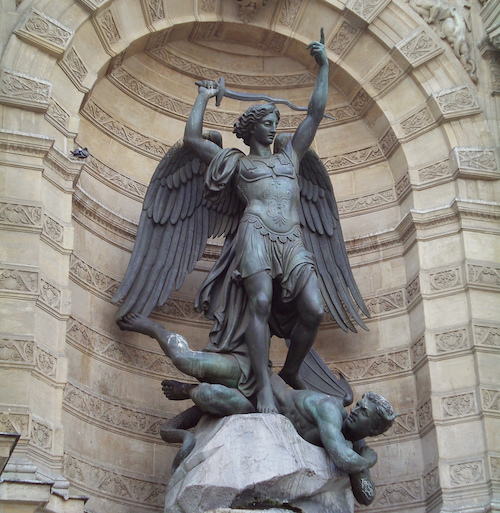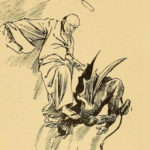We run our website the way we wished the whole internet worked: we provide high quality original content with no ads. We are funded solely by your direct support. Please consider supporting this project.

The Most Quoted Old Testament Verse
No other passage from the Old Testament is quoted more by New Testament authors than Psalm 110:1. Its frequent citation should cause us to pay attention to what is being said. It reads:
The Lord says to my lord, “Sit at my right hand until I make your enemies your footstool.”
In David’s day, it was common for a king to symbolize his conquest of another kingdom by using the defeated ruler’s neck as a footstool. In this Psalm, we have a prophesy that is proclaiming that the Messiah would rule at the “right hand” of God—this is a metaphor that symbolizes power—until he subjugated his enemies by putting his foot on their necks.
In almost every instance, the NT authors associate this verse with Christ’s death and resurrection. For instance, Peter proclaims in the first sermon after Jesus’ ascension:
This Jesus God raised up, and of that all of us are witnesses. Being therefore exalted at the right hand of God, and having received from the Father the promise of the Holy Spirit, he has poured out this that you both see and hear. For David did not ascend into the heavens, but he himself says, “The Lord said to my Lord: ‘Sit at my right hand, until I make your enemies your footstool.’” (Acts 2:32-35)
Then he concludes the sermon:
Therefore let the entire house of Israel know with certainty that God has made him both Lord and Messiah, this Jesus whom you crucified. (Acts 2:36)
Peter is depicting the significance of Christ’s death and resurrection as centering on the way it fulfills Ps 110:1. By raising Christ from the dead, the Father has made his Son “both Lord and Messiah,” and has now set him at “his right hand” so he can reign over his enemies until they are made his footstool. In this sense, the death and resurrection of Jesus was, for Peter, first and foremost an act of war.
Paul expresses the same conviction in the first letter to the Corinthians. In a passage about the final resurrection, Paul states:
For as all die in Adam, so all will be made alive in Christ. But each in his own order: Christ the first fruits, then at his coming those who belong to Christ. Then comes the end, when he hands over the kingdom to God the Father, after he has destroyed every ruler and every authority and power. For he must reign until he has put all his enemies under his feet. (1 Cor 15:22-25)
The resurrection enthroned Jesus over every ruler, authority, and power, and when they are finally destroyed, the goal of the incarnation, death, and resurrection of the Son of God will be achieved.
The death and resurrection of Christ was, for Paul, most fundamentally a decisive act of war initiated by God against everything that opposes him. It put Christ in a position above all demonic powers, and he shall continue to battle from this exalted position until every one of these powers has been destroyed.
The book of Hebrews also quotes this Psalm, noting that Jesus is superior to all angelic powers because it was to him, not to them, that the Father offered to “sit at my right hand until I make your enemies a footstool for your feet” (1:13). In chapter 10, we read that this enthronement occurred only because of Jesus’ sacrifice on the cross (10:12-13). We again see that Jesus’ death and resurrection were the means by which he gained the decisive upper hand over the enemies of God.
The central point is this: the work of the cross and the resurrection is about dethroning a cruel, illegitimate ruler and reinstating a loving, legitimate one: Jesus Christ. While this is not fully realized as a completed act, it has already been accomplished in principle through the cross and resurrection of Jesus, through which God stripped Satan and all levels of demons of all their power (Col 2:15). Therefore Christ now reigns in the power of God far above all such demonic powers. All things are already “under his feet.”
—Adapted from God at War, pages 242-246
Photo credit: Michel Hébert via VisualHunt.com / CC BY-SA
Category: General
Tags: Atonement, Cross, Power, Salvation, Spiritual Warfare, Warfare Worldview
Related Reading

Podcast: How Much ‘War’ is there in Spiritual Warfare?
Greg considers violence in the spiritual realm. http://traffic.libsyn.com/askgregboyd/Episode_0241.mp3

How do I avoid feeling like God is absent?
Question: I used to see God involved in everything and used to believe every event expressed God’s will. After my wife and I lost our child in a tragic accident, and as a result of reading your books (especially Is God to Blame?), I came to embrace the warfare worldview and the open view of…

Sermon Clip: God In The Gallows
Greg has recently returned from a three week trip in Europe, and today he shares stories of how the Kingdom message of a Jesus-looking God, radical love and non-violence is truly spreading all over the world. You can view the full sermon here: http://whchurch.org/sermons-media/sermon/god-in-the-gallows

If Creation is Created in the Middle of Cosmic Warfare, How Can God Call It All Good?
In this episode Greg discusses creation, in the context of cosmic warfare, and considers how God could call it “good.” Links: Greg’s book: “God at War“ http://traffic.libsyn.com/askgregboyd/Episode_0022.mp3

What the Cross Tells Us About God
Whether we’re talking about our relationship with God or with other people, the quality of the relationship can never go beyond the level of trust the relating parties have in each other’s character. We cannot be rightly related to God, therefore, except insofar as we embrace a trustworthy picture of him. To the extent that…

Podcast: Did the Devil Make Me Do It?
Greg peeks into the complexity of our spiritual world and offers wisdom for discerning spiritual activity. http://traffic.libsyn.com/askgregboyd/Episode_0299.mp3
